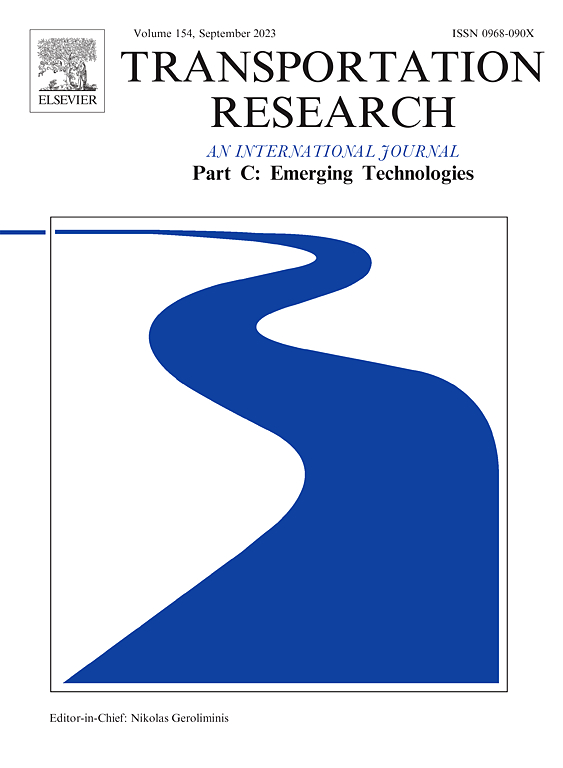MNT-TNN: spatiotemporal traffic data imputation via compact multimode nonlinear transform-based tensor nuclear norm
IF 7.6
1区 工程技术
Q1 TRANSPORTATION SCIENCE & TECHNOLOGY
Transportation Research Part C-Emerging Technologies
Pub Date : 2025-09-29
DOI:10.1016/j.trc.2025.105348
引用次数: 0
Abstract
Imputation of random or non-random missing data is a long-standing research topic and a crucial application for Intelligent Transportation Systems (ITS). However, with the advent of modern communication technologies such as Global Satellite Navigation Systems (GNSS), traffic data collection has introduced new challenges in random missing value imputation and increasing demands for spatiotemporal dependency modelings. To address these issues, we propose a novel spatiotemporal traffic imputation method based on a Multimode Nonlinear Transformed Tensor Nuclear Norm (MNT-TNN), which can effectively capture the intrinsic multimode spatiotemporal correlations and low-rankness of the traffic tensor, represented as location location time. To solve the nonconvex optimization problem, we design a proximal alternating minimization (PAM) algorithm with theoretical convergence guarantees. We also suggest an Augmented Transform-based Tensor Nuclear Norm Families (ATTNNs) framework to enhance the imputation results of TTNN techniques, especially at very high miss rates. Extensive experiments on real datasets demonstrate that our proposed MNT-TNN and ATTNNs can outperform the compared state-of-the-art imputation methods, completing the benchmark of random missing traffic value imputation.
MNT-TNN:基于紧凑多模非线性变换的张量核范数的时空交通数据输入
随机或非随机缺失数据的输入是一个长期研究的课题,也是智能交通系统(ITS)的一个重要应用。然而,随着全球卫星导航系统(GNSS)等现代通信技术的出现,交通数据采集在随机缺失值估算和时空依赖关系建模方面提出了新的挑战。为了解决这些问题,我们提出了一种基于多模非线性变换张量核范数(MNT-TNN)的时空交通插值方法,该方法可以有效地捕获交通张量(位置×位置×时间)固有的多模时空相关性和低秩性。为了解决非凸优化问题,我们设计了一种具有理论收敛性保证的邻域交替最小化算法。我们还提出了一个基于增广变换的张量核范数族(ATTNNs)框架,以增强TTNN技术的imputation结果,特别是在非常高的缺失率下。在实际数据集上的大量实验表明,我们提出的MNT-TNN和attnn可以优于目前比较的最先进的插值方法,完成了随机缺失流量值插值的基准。
本文章由计算机程序翻译,如有差异,请以英文原文为准。
求助全文
约1分钟内获得全文
求助全文
来源期刊
CiteScore
15.80
自引率
12.00%
发文量
332
审稿时长
64 days
期刊介绍:
Transportation Research: Part C (TR_C) is dedicated to showcasing high-quality, scholarly research that delves into the development, applications, and implications of transportation systems and emerging technologies. Our focus lies not solely on individual technologies, but rather on their broader implications for the planning, design, operation, control, maintenance, and rehabilitation of transportation systems, services, and components. In essence, the intellectual core of the journal revolves around the transportation aspect rather than the technology itself. We actively encourage the integration of quantitative methods from diverse fields such as operations research, control systems, complex networks, computer science, and artificial intelligence. Join us in exploring the intersection of transportation systems and emerging technologies to drive innovation and progress in the field.

 求助内容:
求助内容: 应助结果提醒方式:
应助结果提醒方式:


